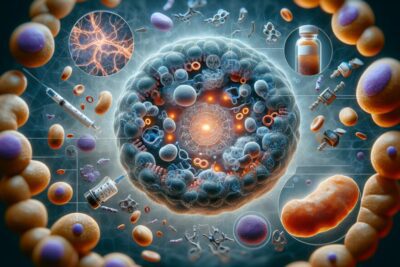
GLP-1s and gallbladder disease are increasingly important topics in the realm of diabetes management and overall health. With the rise of GLP-1 receptor agonists as a treatment option, understanding their impact on gallbladder health is crucial.
Glucagon-like peptide-1 (GLP-1) receptor agonists are a class of medications used to treat type 2 diabetes. These drugs work by mimicking the action of the hormone GLP-1, which helps to lower blood sugar levels. However, recent studies have shown that there may be a connection between GLP-1s and gallbladder disease, raising concerns for patients who are considering this treatment option or are currently using it.
🔍 Seeking a breakthrough in Type 2 Diabetes management?
Discover our expert insights and innovative approaches on ‘How to Cure Diabetes’.
Click to transform your health journey today!
What you\'ll find in this article?
- How Do GLP-1 Receptor Agonists Affect Gallbladder Health?
- What Is The Connection Between GLP-1s And Cholecystitis?
- Can GLP-1s Lead To Increased Risk Of Gallbladder Diseases?
- What Are The Safety Concerns Regarding GLP-1s And Gallbladder Issues?
- Can I Take Ozempic After Gallbladder Removal?
- What Should Patients Know About GLP-1s If They've Had Gallbladder Surgery?
- Exploring the Link between GLP-1s and Gallbladder Disease
- Related Questions on GLP-1s and Gallbladder Disease
How Do GLP-1 Receptor Agonists Affect Gallbladder Health?
GLP-1 receptor agonists influence the gallbladder in several ways. Primarily, they affect how the organ empties bile. Research indicates that these medications may slow gallbladder motility, potentially leading to the formation of gallstones and other gallbladder diseases.
Monitoring gallbladder health during GLP-1 therapy is essential. Patients using these medications should be aware of gallbladder disease symptoms and seek medical advice if they experience any signs indicating potential problems.
As a precaution, healthcare providers should consider the risks of GLP-1s on the gallbladder when prescribing these drugs and discuss safety considerations with their patients.
It is worth noting that not all patients will experience adverse effects on gallbladder health, but being informed and vigilant is key to ensuring safety during treatment with GLP-1 receptor agonists.








Explore our specialized services in diabetes care 🌟.
From personalized diet plans to effective exercise routines, we have what you need to take control of Type 2 Diabetes.
Visit our services page now!
What Is The Connection Between GLP-1s And Cholecystitis?
The connection between GLP-1s and cholecystitis, an inflammation of the gallbladder, lies in the altered bile dynamics that these drugs can induce. By affecting how the gallbladder functions, GLP-1 receptor agonists can lead to conditions that predispose individuals to cholecystitis.
Patients should be aware that cholecystitis can manifest with symptoms such as abdominal pain, nausea, vomiting, and fever. If any of these gallbladder disease symptoms are observed, it is important to seek medical help promptly.
Understanding the risks of GLP-1s for gallbladder health includes recognizing the potential for developing cholecystitis and being informed about treatment options available.
Despite the benefits of GLP-1 receptor agonists in diabetes management, patients with a history of gallbladder issues need to consider these risks carefully with their healthcare provider.
Can GLP-1s Lead To Increased Risk Of Gallbladder Diseases?
Studies have indicated that the use of GLP-1 receptor agonists may be associated with an increased risk of gallbladder diseases. The increased relative risks identified in clinical trials underline the importance of assessing individual patient risk factors before initiating therapy with GLP-1s.
GLP-1 agonists and their impact on biliary diseases is a complex issue. While these medications offer significant benefits for diabetes control and weight loss, they must be used judiciously in light of potential gallbladder complications.
It is recommended that patients and healthcare providers engage in open dialogues about the potential risks versus benefits of using GLP-1 receptor agonists, especially considering the patient's medical history and the presence of any gallbladder-related issues.
What Are The Safety Concerns Regarding GLP-1s And Gallbladder Issues?
There are several safety concerns regarding the use of GLP-1s and the risk of gallbladder issues. In particular, the FDA has noted cases of acute cholecystitis associated with GLP-1 receptor agonists that lacked appropriate warnings in their prescribing information.
Patients need to be informed about the potential for serious outcomes, including hospitalization and the need for cholecystectomy. Additionally, the onset of acute cholecystitis within a short timeframe of starting GLP-1 RA therapy is a particularly concerning aspect that warrants attention.
- Regular monitoring of gallbladder health is advisable for patients on GLP-1 therapy.
- Patient education on recognizing early symptoms of gallbladder issues is crucial.
- Healthcare providers should review the latest safety data and guidelines when considering GLP-1 therapy for their patients.
It is paramount that updated warnings and precautions be included in the prescribing information of GLP-1 RA products to reflect the risks associated with gallbladder disease.
Can I Take Ozempic After Gallbladder Removal?
Patients who have undergone gallbladder removal, or cholecystectomy, may question whether they can safely take Ozempic, a popular GLP-1 receptor agonist. The answer is generally yes, but it comes with certain considerations.
Since the gallbladder is no longer present to store bile, the dynamics of bile secretion are altered. As such, GLP-1s and post-surgery gallbladder patients require careful monitoring and possibly dosage adjustments.
It's important for patients to openly discuss their medical history and any concerns with their healthcare provider to ensure that the use of Ozempic or similar medications is safe and effective for their specific situation.
Monitoring for any adverse symptoms post-surgery is also important, as the body adjusts to the absence of the gallbladder and the effects of the medication.
What Should Patients Know About GLP-1s If They've Had Gallbladder Surgery?
Patients who have had gallbladder surgery should be aware of several key points when considering or continuing treatment with GLP-1 receptor agonists.
First and foremost, it's essential to communicate with healthcare providers about the history of gallbladder surgery. This information can significantly impact the management of diabetes treatment using GLP-1s.
Potential side effects or changes in the body post-surgery may influence how GLP-1 receptor agonists work, necessitating adjustments in medication or monitoring protocols.
Patients should also be aware of any new or changing symptoms and report them to their healthcare provider immediately to ensure timely intervention if necessary.
Lastly, staying informed about the latest research and guidelines regarding GLP-1 receptor agonists post-gallbladder surgery is crucial for patient safety and optimal treatment outcomes.
Exploring the Link between GLP-1s and Gallbladder Disease
The relationship between GLP-1 receptor agonists and gallbladder health is a subject of ongoing research. As we delve deeper into this topic, it is important for patients and healthcare providers alike to stay abreast of the latest findings.
By understanding the link between these medications and gallbladder disease, we can better manage the risks associated with their use in diabetes treatment.
Watch the following video to learn more about the impact of GLP-1 receptor agonists on gallbladder health:
Can You Take Ozempic If You Have Gallbladder Disease?
Ozempic can be taken by individuals with gallbladder disease, but it should be done under the supervision of a healthcare provider. It's imperative to monitor for any worsening of symptoms or the emergence of new issues.
Each patient's medical history and current health condition are important factors in determining the safety of continuing with Ozempic after gallbladder disease has been diagnosed.
Who Should Not Use a GLP-1?
Individuals with a personal or family history of medullary thyroid carcinoma or patients with Multiple Endocrine Neoplasia syndrome type 2 should not use GLP-1 receptor agonists. Additionally, patients with a history of severe gastrointestinal disease could be advised against GLP-1 therapy due to potential adverse effects on gut motility.
It's also worth considering the risks in patients with known gallbladder diseases or those at high risk for such conditions.
How Does Wegovy Affect the Gallbladder?
Wegovy, like other GLP-1 receptor agonists, may affect gallbladder motility and could potentially lead to gallbladder issues such as gallstones or cholecystitis. Patients using Wegovy should be aware of this risk and report any gallbladder disease symptoms to their healthcare provider.
Regular check-ups and possibly even imaging studies may be recommended for long-term users to ensure gallbladder health is maintained.
Why Does Tirzepatide Cause Gallbladder Issues?
Tirzepatide's impact on the gallbladder is similar to that of other GLP-1 receptor agonists in that it can slow down gallbladder emptying, potentially leading to gallstones and cholecystitis.
Patients taking tirzepatide should be vigilant about their gallbladder health and seek immediate medical attention if they experience any related symptoms.
Safety considerations for patients using GLP-1s must include discussions about potential gallbladder issues, and healthcare providers should tailor treatment plans to the needs and risks of each individual patient.
✨ Other articles you might be interested in:
- Essential strategies to protect your eyesight
- Managing Hyperglycemia (High Blood Glucose): Essential Tips and Treatments
- Exploring additional types of neuropathy: Beyond the common categories
- Understanding Insulin Resistance and Diabetes | ADA Explained
- Understanding Sex and Diabetes | ADA: Managing Intimacy and Blood Sugar Levels



